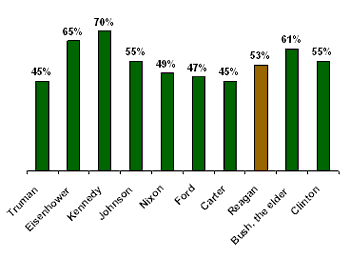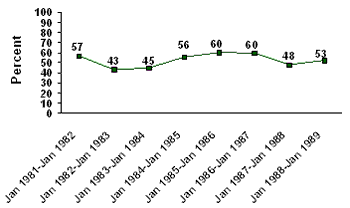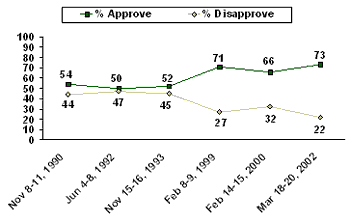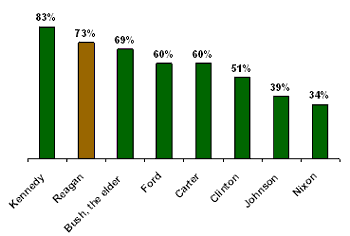GALLUP NEWS SERVICE
PRINCETON, NJ -- Ronald Reagan, the nation's 40th president, became one of the nation's most revered public figures in recent years, a distinct turnabout from the more routinely average ratings he received while he served in office between 1981 and 1989. Reagan's job approval ratings in his first years in office were hurt by the bad economy, and the last years of his administration were marred by the negative fallout from what came to be known as the Iran-Contra affair. Nevertheless, Americans have more recently upgraded their retrospective approval of the job he did as president, and now routinely think of Reagan as one of the nation's more outstanding presidents. Reagan has appeared in the Top 10 of Gallup's annual Most Admired Man list more than 30 times, more often than any other person except evangelist Billy Graham.
Reagan's Ratings While He Was in Office
Reagan was not an extraordinarily well-regarded president during his eight years in office. He averaged a 53% job approval rating during his presidency, slightly below average for all U.S. presidents for which Gallup has recorded job approval ratings.
Reagan's ratings were higher than the averages of his three immediate predecessors -- Jimmy Carter, Gerald Ford, and Richard Nixon, supporting the arguments of those who contend that one of Reagan's major contributions was to restore confidence in the presidency after the battering it took in the 1970s. But the two presidents who followed Reagan, George H.W. Bush and Bill Clinton, each had higher average ratings than Reagan, as did three earlier presidents -- Lyndon Johnson, John F. Kennedy, and Dwight Eisenhower.
| Presidential Job Approval: Averages for Presidents |
 |
That's not to say Reagan didn't have periods of time during his administration in which he received solidly impressive ratings. He did. But Reagan was bedeviled at the beginning of his administration by Americans' major concerns about the economy, and at the end of his administration by public concerns about the Iran-Contra affair.
In the most general sense, Americans' approval of the job being done by Reagan as president during his eight years in office can be described as a bell-shaped curve of sorts, with Reagan's ratings starting low, rising in late 1983 and in 1984 (just in time for his successful 1984 re-election bid), and then falling in the last years of his administration.
| Ronald Reagan's Job Approval: Yearly Averages, 1981-1988 |
 |
Reagan came into office on a fairly high note, with initial job approval ratings as high as 60% by mid-March 1981. Then, on March 30, Reagan was shot on the streets of Washington by John Hinckley Jr., and the resulting concern and sympathy helped lift his ratings to 68% by May. But even as Reagan personally recovered from his wounds, the public's concerns about the bad economy did not, and the president's ratings began to fall as each month went by.
By the end of 1981, Reagan's job approval rating had drifted down to 49%.
Things got worse for Reagan in 1982. The public's view of the economy remained sour, and the president's ratings during 1982 stayed concomitantly low, in the 40% range, ending the year at 41%. The 1982 midterm elections were not good ones for Reagan and for the GOP. The Republicans lost about 25 seats in the House.
A clear cause for all of this was the economy. Still, Gallup analysts at the time presciently noted that there was some cause for optimism for Reagan:
Throughout the year [1982] a solid majority of Gallup's respondents have taken the position that Reaganomics will worsen, rather than improve, their own financial situation. Yet, Gallup consistently has found somewhat more public faith that Reaganomics will help the nation as a whole and even more faith in the president's program when the question is posed with regard to the long run. Surveys also indicate that the public has more confidence in Reagan than approval ratings of his performance would suggest. While only one third approve of the way he is handling the economy, close to half express some degree of confidence that he will do the right thing with regard to the economy.
Indeed, although 1983 began for Reagan with a 35% job approval rating -- the worst of his administration -- things started to look better.
His ratings moved back above 50% by November 1983 -- not only because the economy was picking up, but also in part as a result of rally effects associated with the U.S. invasion of Grenada and the terrorist explosion that killed 241 American Marines in Beirut, Lebanon.
By 1984, Reagan's job approval ratings were consistently above the 50% line that is a symbolic standard for an incumbent president seeking re-election. In Gallup's last October poll before the November 1984 election, Reagan received a 58% job approval rating, and he went on to soundly defeat Democratic nominee Walter Mondale by a 59% to 41% popular vote margin, receiving 525 electoral votes to Mondale's 13.
Reagan continued to soar in 1985, routinely receiving ratings in the 60% range. In May 1986, Reagan received a 68% job approval rating, tied for the highest of his administration.
Then, in November 1986, the Iran-Contra affair broke into the news. That same month, Reagan was on television denying that there had been any trading of arms for hostages, but the damage was done. His ratings plummeted from 63% in late October to 47% in early December, and stayed relatively low throughout 1987. Reagan's ratings underwent a slight rebound in the late summer and early fall of 1988 as his vice president, George H.W. Bush, campaigned for the presidency against Michael Dukakis.
Reagan's last two Gallup job approval ratings before he left office were 57% in mid-November and 63% in December 1988.
The highest job approval rating of the Reagan administration was 68% -- reached twice, in May 1981 and as previously indicated, in May 1986. As noted, the low point was 35% in January 1983.
Favorable Ratings of Reagan
Both in and out of office, Reagan was always well-liked by the American public -- based on ratings measuring the public's personal opinion rather than its assessment of his job performance. Between 1984 and 1988, Gallup consistently found more than 6 in 10 Americans holding a favorable view of Reagan, including a substantial 81% in October 1986. Even during the 1982 recession, when only about 4 in 10 Americans approved of the job Reagan was doing as president, 6 in 10 Americans rated him on the positive end of a 10-point rating scale. In Gallup's most recent measure of favorability about Reagan, taken in January 2001, 74% of Americans had a favorable opinion of him, and only 23% were unfavorable.
Reagan in Historical Perspective
Americans' perceptions of Reagan's presidency have risen considerably in recent years. His average approval rating for 1988, his last full year as president, was 53% -- identical to the average for the entire eight years of his presidency. Yet, when Americans were asked in 2002 to state whether they approved or disapproved of the way Reagan handled his presidency, retrospectively, 73% approved.
This increase in retrospective approval didn't occur at once. Three Gallup ratings in 1990, 1992, and 1993 showed Reagan's job approval rating in the 50% to 54% range -- little different from the average while he was in office. Reagan publicly announced that he was suffering from Alzheimer's disease in 1994, and it's possible that the sympathy and concern his condition has elicited over the last decade are in part responsible for the elevated retrospective job approval ratings he has received since.
| Retrospective Job Approval Ratings
for Ronald Reagan |
 |
Only Kennedy's retrospective approval rating exceeded Reagan's in 2002, with an approval score of 83%. The elder George Bush trailed Reagan with 69%. Further behind were Carter and Ford with 60% each, and Clinton with 51%. Nixon's ratings were the worst in this poll, with only 34% approving and 54% disapproving. Johnson's rating of 39% was also low, but this was partly due to the high percentage expressing no opinion.
| Presidential Job Approval: Retrospective Approval Ratings for Presidents percentage who approved of each president |
 |
| March 2002 |
A 1999 poll asked Americans how five recent presidents (Nixon, Carter, Reagan, Bush, and Clinton) would go down in history. Reagan was rated most positively, with 12% of Americans saying Reagan would be judged in history as an "outstanding president," and with an additional 42% saying "above average." Reagan typically scored well on this measure in the eight times it has been asked about him.
How do you think each of the following presidents will go down in history -- as an outstanding president, above average, average, below average, or poor? [RANDOM ORDER]
Ronald Reagan
|
Out-standing |
Above |
|
Below average |
|
No |
|
|
% |
% |
% |
% |
% |
% |
|
|
1999 Aug 3-4 |
12 |
42 |
34 |
7 |
5 |
* |
|
1993 Jan 8-11 |
8 |
30 |
37 |
15 |
9 |
1 |
|
1988 Dec 27-29 |
17 |
42 |
25 |
9 |
5 |
2 |
|
1988 Sep 25-Oct 1 |
12 |
40 |
24 |
11 |
9 |
4 |
|
1987 Jul 10-13 |
9 |
28 |
34 |
16 |
10 |
3 |
|
1986 Mar 7-10 |
16 |
46 |
23 |
8 |
5 |
2 |
|
1985 Jan 25-28 |
15 |
40 |
27 |
9 |
5 |
4 |
|
* Less than 0.5% |
||||||
The only president to score better on this measure than Reagan in eight measures taken between 1985 and 1999 was Franklin D. Roosevelt (though Kennedy was not included in these polls). In April 1997, Roosevelt was viewed as outstanding by 31% of the public, and as above average by an additional 36%. (Coincidentally, Gallup was updating this measure in a poll being conducted this past weekend, when news of Reagan's death became public on Saturday. The preliminary data -- collected before Reagan's death -- showed Reagan ranking third behind Roosevelt and Kennedy.)
Last November, Gallup asked the public -- in an open-ended format -- whom they regarded as the greatest U.S. president. Reagan placed third on the list, behind only Kennedy and Abraham Lincoln. Reagan has consistently placed in the top five since the question was first asked in 1999, and actually topped the list in a 2001 poll conducted around the celebration of his 90th birthday.
Who do you regard as the greatest United States president?
|
Nov 10-12, |
Apr 5-6, |
Feb 9-11, |
Feb 14-15, |
Feb |
|
|
% |
% |
% |
% |
% |
|
|
John Kennedy |
17 |
13 |
16 |
22 |
12 |
|
Abraham Lincoln |
17 |
15 |
14 |
18 |
18 |
|
Ronald Reagan |
13 |
10 |
18 |
11 |
12 |
|
Franklin Roosevelt |
11 |
9 |
6 |
12 |
9 |
|
Bill Clinton |
9 |
11 |
9 |
5 |
12 |
|
George Washington |
7 |
7 |
5 |
5 |
12 |
|
George W. Bush |
3 |
11 |
-- |
-- |
-- |
|
Harry Truman |
3 |
4 |
6 |
3 |
4 |
|
Thomas Jefferson |
3 |
2 |
1 |
3 |
2 |
|
Theodore Roosevelt |
3 |
2 |
2 |
3 |
3 |
|
Jimmy Carter |
3 |
3 |
4 |
3 |
3 |
|
Dwight Eisenhower |
2 |
1 |
1 |
3 |
2 |
|
George Bush (the elder) |
2 |
2 |
3 |
3 |
5 |
|
Richard Nixon |
1 |
1 |
1 |
2 |
2 |
|
Other |
2 |
2 |
5 |
3 |
1 |
|
None |
* |
1 |
2 |
* |
1 |
|
No opinion |
4 |
6 |
7 |
4 |
2 |
|
^ Asked of half sample. |
|||||
|
* Less than 0.5% |
|||||
When the question has been limited to just the presidents since World War II, as one might expect, Reagan trails only Kennedy.
Thinking about the U.S. presidents we have had since World War II -- Truman, Eisenhower, Kennedy, Johnson, Nixon, Ford, Carter, Reagan, Bush, and Clinton -- which one would you consider the greatest president?
|
Feb 2000 |
Feb 1999 |
Apr 1986^ |
|
|
Greatest Since WWII |
% |
% |
% |
|
Kennedy |
32 |
27 |
32 |
|
Reagan |
19 |
20 |
21 |
|
Truman |
12 |
12 |
12 |
|
Eisenhower |
9 |
8 |
5 |
|
Clinton |
9 |
12 |
-- |
|
Carter |
4 |
6 |
2 |
|
Bush |
4 |
6 |
-- |
|
Nixon |
3 |
3 |
3 |
|
Johnson |
1 |
2 |
* |
|
Ford |
1 |
1 |
1 |
|
Roosevelt |
-- |
-- |
17 |
|
NONE (vol.) |
* |
1 |
-- |
|
No opinion |
6 |
2 |
7 |
|
(vol.) Volunteered response |
|||
|
* Less than 0.5% |
|||
|
^ Question wording: "Thinking about our last nine U.S. presidents, that is, Roosevelt, Truman, Eisenhower, Kennedy, Johnson, Nixon, Ford, Carter, and Reagan, which one would you consider the best president?" |
|||
Most Admired Man
Given Reagan's generally positive favorability ratings, it is not surprising that he frequently appeared on Gallup's annual list of most admired men in the world. Reagan ranked as the most admired man eight times, from 1981-1988, the eight years of his presidency. Reagan has appeared in the top 10 most admired men 28 times from 1974-2003. All told, Reagan has appeared on the list 31 times, second only to Graham (47 appearances). Reagan first appeared on the list in 1966, shortly after winning the California governorship.
|
Most Appearances in Top Ten of Gallup's Annual "Most Admired Man" Poll
|
|
|
Billy Graham |
47 |
|
Ronald Reagan |
31 |
|
Pope John Paul II |
26 |
|
Jimmy Carter |
22 |
|
Dwight Eisenhower |
21 |
|
Richard Nixon |
21 |
|
Harry Truman |
20 |
|
Edward Kennedy |
18 |
|
Winston Churchill |
17 |
|
George H.W. Bush |
16 |
|
Douglas MacArthur |
15 |